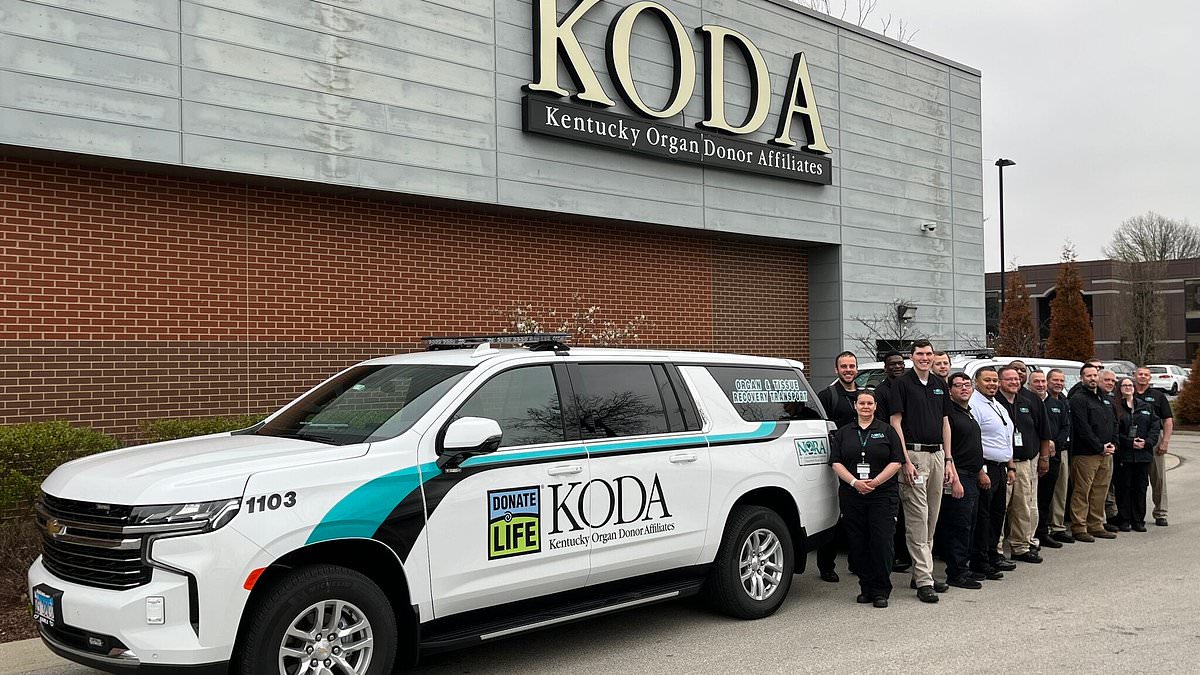A former employee of a nonprofit organ recovery group has claimed she was asked to harvest organs from a person who was still living – and then fired after airing her qualms to members of Congress.
Nyckoletta Martin, 38, made the latter revelations Tuesday to the Wall Street Journal, describing how she was let go by organ collection group Kentucky Organ Donor Affiliates on September 13.
Days before, a letter she wrote to the House Energy and Commerce Committee’s Oversight and Investigations Subcommittee was read and discussed on the House floor, after it alleged that there is currently outsized pressure on organ collectors.
Singling out the organ-procurement group in Kentucky where she worked, she recalled being pressured to retrieve organs from a patient before he died – while he was awake. He later left the facility alive, Martin said – choosing not to name him.
Kentucky Organ Donor Affiliates, abbreviated KODA, is one of 56 federally chartered nonprofits tasked with procuring organs for transplant. A spokesperson said the firm ‘strictly adheres’ to laws and national guidelines set in place by the US government.
Scroll down for video:
‘What is clear to me from my time at KODA is that the [organ procurement organization] does not operate in patients’ interests,’ Martin, a mom-of-five, wrote in the letter sent to the committee.
‘[The group] regularly engages in unethical activities for the sole purpose of trying to keep its lucrative government contract,’ she added.
The letter went on to claimed that when a surgeon refused officials’ order, Martin and other workers were ordered to find a different surgeon who would do it willingly.
They refused as well, she said – allowing the patient to later leave alive after he recovered.
The patient’s condition and malady was not made clear by what was read, as other statements sent by alleged witnesses saying they have witnessed similar activity were read as well.
All insisted that procurement groups in various states – like KODA – have begun to push workers and surgeons to take organs from patients who were still alive.
A liver transplant surgeon at the University of Alabama at Birmingham, Robert Cannon, told the committee how he was allegedly told to procure organs from a spontaneously breathing patient, which he said ‘would have been murder.’
Greg Segal, head of an advocacy group that seeks to reform the organ procurement process, alleged another Organ Procurement Organization (OPO) had given potential organ donors doses of fentanyl to hasten their deaths.
He did not provide any evidence to support those claims, as was the case with Martin, who is a mother of five.
She said the incident in question occurred at a Kentucky hospital in 2021, and that the man KODA wanted her to retrieve organs from was ‘crying’ and ‘shaking his head “No” as she, the surgeon, and other procurement workers refused their requests.
She told the Journal how she later quit the KODA job and found work at Paragonix – a leading organ transport products and services company.
There, she helps surgeons prepare organs for transit, following their removal from deceased donors.
She also connected the paper with the sister of the patient she says was almost killed, Donna Rhorer.
While not substantiating Martin’s claims, the woman said her brother has improved since leaving the hospital three years ago, but still has brain damage and is undergoing speech and occupational therapy.
No other details were provided.
The House Energy subcommittee, meanwhile, held the meeting to address the Health Resources and Services Administration’s (HRSA) ongoing updates to the Organ Procurement and Transplantation Network, which firms like KODA belong to.
There, reps took turns criticizing UNOS (United Network for Organ Sharing), the body manages the OPTN. Others called for ‘reform,’ ‘transparency,’ and ‘accountability’, as well as a ‘complete overhaul’ of organ transplantation systems.
Dr. Cannon, at one point, said, ‘I’ve had an OPO administrator recommend I proceed with organ procurement despite legitimate concerns that the donor was still alive.’
Dr. Karp, meanwhile, alleged corruption and mismanagement by both UNOS and OPTN, framing the board and committee volunteers managing both as ‘industry insiders’ who have inherent conflicts of interest with their institution or professional organizations.
In broad daylight, the OTPN suppresses data suggesting that new policies increase organ discards and lead to more patient deaths, and continues to ignore the increased discards, complexity, and costs generated by their new policies,’ he said.
‘In broad daylight, the OTPN take credit for increased donation even though these numbers are driven by technological advancements and deaths from the opioid epidemic.
‘In the backroom, OPTN leaders assure that no OPO leader will be held accountable for poor performance, and seek to prevent competition,’ he continued.
‘They threaten to sabotage any new contractor by refusing to release data and share information centers, and intimidated and retaliated against those in the community with whom they disagreed.’
The Kentucky Attorney General’s Office said it is investigating the allegation against KODA, which went on to slam Martin’s claims in a statement.
‘Our commitment to ethical practices means that we follow rigorous protocols to ensure patient safety and integrity throughout the organ donation process,’ it read.
‘Organ donation only proceeds after a patient has been declared deceased by independent clinicians from the treating hospital, and we have clear procedures to follow if a patient’s condition changes.
‘We do not make determinations of death, nor do we compromise ethical standards for organ donation.’
